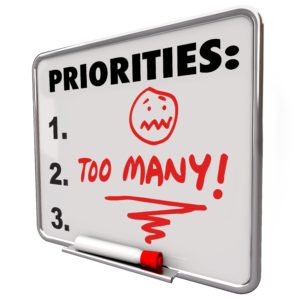Picture this: it’s midnight, you’re collapsing into your bed absolutely exhausted by all you have done since 6 am, your mind is racing with all you need to do tomorrow and no matter what you do you feel like it you’re spinning your wheels. Sound familiar? This image describes many individuals who are bright, capable and hard-working with too much to do and who feel life is out of balance. Each day is another round of “whack a mole” reacting to or dealing with whatever problem pops up next rather than feeling in control and engaged with what is important. In addition, the idea that you can have or do it all is unrealistic because time and energy are limited commodities. In the past decade research from the emerging field of positive psychology has shown that one of the most important elements necessary for living a fulfilled engaged life is setting and working toward goals that have meaning, provide pleasure, utilize our individual strengths and connect us to a greater purpose. In order to reach these goals, we need to set priorities that align with our values and strengths.
Author Stephen Covey in his book The 7 Habits of Highly Effective People says that most of us spend too much time on what is urgent and not enough time on what is important. Let’s face it, most days we all are bombarded with urgent matters, distracted by technology 24/7 and the need to try to fix whichever “wheel is squeaking the loudest.” While this is necessary sometimes, this approach can become an unhealthy habit unless we set priorities. How can you tell the difference between what is important and what is urgent? Important activities are determined by our values and help us achieve our goals while urgent activities need to be done immediately and are usually based on someone else’s goal or deadline. Of course an activity can be urgent and important but it can also be urgent and not important. Understanding the difference can help us set priorities.
Three Steps to Create Priorities
The first step is to define our personal values. What is most important to you? What could you not live without? (and no, coffee is not a value) Think back to a time when you did felt engaged and fulfilled in life. What needs were being met, what were you doing? This answer will give you clues to your values. You may value fairness, personal growth, recognition, generosity, leadership, health or many other qualities. In a nutshell, your values are the things that you believe are most important in the way you live and work. Therefore when our values are not in line with our actions we will feel uncomfortable. For example, if we value family and at the same time consistently spend 80 hours a week at work, we won’t feel happy.
The second step is to write a personal mission statement. Much like a mission statement for a business that incorporates the values and strengths of the business, a personal statement does the same for our life. A personal mission statement can encompass all areas of our life or we can break it into smaller statements for different facets including work, home, relationships, fun, finance and health . The mission statement is a living document that can be tweaked or changed as life circumstances change. Most importantly is that it contains our values and strengths so that when we are living by our mission statement we feel fully engaged with life.
The final step is to use the mission statement on a weekly or daily basis to set short term priorities. When we do this we can make conscious choices about what is most important. We may realize that many of the tasks we are busying ourselves with are really not that urgent or maybe they are something someone else should and could do. It’s a great way to let go of meaningless expectations and ideas of doing it all. Instead we do it all on our terms.
Picture this: You are settled into bed, it’s 10pm, you feel ready for rest, you feel you did your best today and look forward to your goals for tomorrow. You feel fulfilled, engaged and relaxed. It all comes from the choice to set priorities based on values and strengths and what is important.


